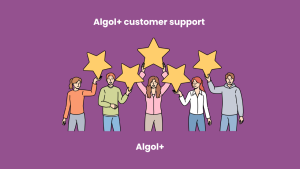Interview with the creator of Algol+ plugins
Table of Contents
Alex is the founder of Algol+ and has been creating plugins for WooCommerce for over 5 years. He focuses on making high-quality, reliable tools that help online store owners manage their businesses better.
Algol+ offers a range of powerful plugins designed to enhance WooCommerce stores. Notable plugins include:
- Advanced Dynamic Pricing for WooCommerce: This plugin allows store owners to create flexible pricing rules and discounts, helping to boost sales and manage promotions effectively.
- Advanced Order Export for WooCommerce: A tool that simplifies the process of exporting order data, enabling easy reporting and data analysis for better business insights.
- Phone Orders for WooCommerce: This plugin streamlines the process of taking orders over the phone, making it easier for businesses to handle customer requests and improve service efficiency.
Can you tell us about your background and how you got started developing plugins for WooCommerce?
I have been programming for over 25 years and have been working with WordPress for the last 15 years. My journey into the world of plugins’ development started when I began taking freelance projects on the platforms like Elance, where clients often needed custom solutions for their WordPress sites. This experience allowed me to understand the intricacies of WordPress and its vast ecosystem.
What inspired you to create plugins like Advanced Dynamic Pricing for WooCommerce and Advanced Order Export for WooCommerce?
As I continued working on various projects, I noticed a growing demand for e-commerce solutions, which naturally led me to explore WooCommerce. I was fascinated by the flexibility and extensibility WooCommerce offered to store owners. Seeing an opportunity to create value, I started developing custom plugins to meet specific client needs. Initially, these were bespoke solutions tailored to individual requirements, but over time, I saw the potential to generalize these tools into plugins that could benefit a broader audience.
The first plugins I developed were simple, addressing common challenges WooCommerce store owners faced, such as dynamic pricing and order management. As these plugins gained popularity and received positive feedback, I continued to expand and refine them, adding more features based on user feedback and emerging trends in the e-commerce industry.
How do you approach the development process for plugins? What are some key considerations and challenges you face?
My primary focus in the development process is ensuring stability. This is paramount because I understand the critical role plugins play in the smooth operation of WooCommerce stores. One of the key strategies I employ is maintaining a unified core for both the free and pro versions of my plugins. This approach allows me to streamline development and ensure consistency across all versions.
What sets your plugins apart from others in the WooCommerce ecosystem?
What sets my plugins apart from others in the WooCommerce ecosystem is the uncompromising emphasis on the quality of code over the speed of adding new features. This philosophy is central to our development process and is reflected in every plugin we release.
We believe that a solid, reliable foundation is crucial for the long-term success and stability of any plugin. To achieve this, we often find ourselves rewriting the same code two or three times to ensure it meets our stringent quality standards. This might seem like an excessive measure, but it allows us to deliver plugins that are not only robust and efficient but also scalable and maintainable.
What are some common issues that WooCommerce store owners face, and how do your plugins address them?
WooCommerce store owners frequently face several common challenges, two of the most prominent being the efficient management of data export and the implementation of dynamic pricing strategies. Our plugins are designed specifically to address these issues, providing robust and user-friendly solutions that significantly reduce the effort required to achieve optimal results.
Firstly, data export is a critical task for any WooCommerce store owner. Whether it’s for accounting purposes, inventory management, or customer insights, the ability to export orders and other data efficiently can save a significant amount of time and reduce errors. Our Advanced Order Export for WooCommerce plugin offers a comprehensive solution to this challenge. It allows store owners to export orders and other relevant data in various formats, including CSV, Excel, and XML. The plugin provides extensive filtering options, custom fields, and scheduling capabilities, making it easy to automate regular exports and ensure that the right data is always at your fingertips.
Secondly, implementing dynamic pricing strategies can be complex, but is essential for maximizing sales and profitability. Our Advanced Dynamic Pricing for WooCommerce plugin simplifies this process by offering a range of powerful pricing rules and discounts. Whether it’s bulk pricing, percentage discounts, or special offers based on customer roles or purchase history, our plugin allows store owners to create and manage these pricing strategies with ease. The intuitive interface and extensive customization options mean that you can set up sophisticated pricing rules without needing to write any code.
How do you prioritize which features to add or update in your plugins?
When it comes to prioritizing which features to add or update in our plugins, we rely on a systematic approach centered around user’s feedback and performance considerations. Our internal tracking system has a crucial role in this process, enabling us to efficiently manage client requests and bug reports.
We actively collect and track user feedback through various channels, including support tickets, email, and our community forums. This feedback is entered into our internal tracking system, where it is categorized and prioritized based on factors such as the number of requests for a particular feature, the impact of reported issues, and the potential benefits to our user base. This structured approach ensures that we address the most pressing needs and valuable enhancements first.
What has been the most challenging aspect of plugin development for WooCommerce?
One of the most challenging aspects of plugin development for WooCommerce is ensuring optimal performance across a wide range of hosting environments and store sizes. Our clients use a variety of hosting solutions, from basic shared hosting to high-performance dedicated servers, and they manage stores that range from small boutiques to large enterprises with tens of thousands of orders and products.
The diversity in hosting environments means that our plugins must be highly efficient and capable of running smoothly even on slower, less powerful servers. This requires meticulous optimization of our code to minimize resource usage and ensure quick response times. We continuously refine our algorithms and processes to enhance speed and reduce the load on servers, providing a seamless experience for all users, regardless of their hosting setup.
How do you ensure the compatibility and reliability across different versions of WooCommerce and WordPress?
Ensuring compatibility and reliability across different versions of WooCommerce and WordPress is a fundamental priority in our plugin development process. To achieve this, we adhere to several key practices that help maintain seamless integration and optimal performance.
Firstly, we prioritize using standard methods and APIs provided by WooCommerce and WordPress to access and modify data. By adhering to these established conventions, we reduce the risk of conflicts and ensure that our plugins remain compatible with the latest updates and changes in both platforms. This approach also helps us leverage the built-in functionality and security features of WooCommerce and WordPress, enhancing the overall reliability of our plugins.
Another critical aspect of ensuring compatibility is our commitment to supporting High-Performance Order Storage (HPOS) mode in WooCommerce. HPOS is designed to improve the performance and scalability of order storage by using custom database tables for orders instead of the default WordPress posts table. All our plugins are developed and tested to fully support HPOS mode, ensuring that they can handle large volumes of orders efficiently and provide fast, reliable performance.
What’s next for you and your team in terms of plugin development?
Currently, we are actively working on a new plugin that we plan to release within this year. This upcoming plugin represents a significant step-up for us.


